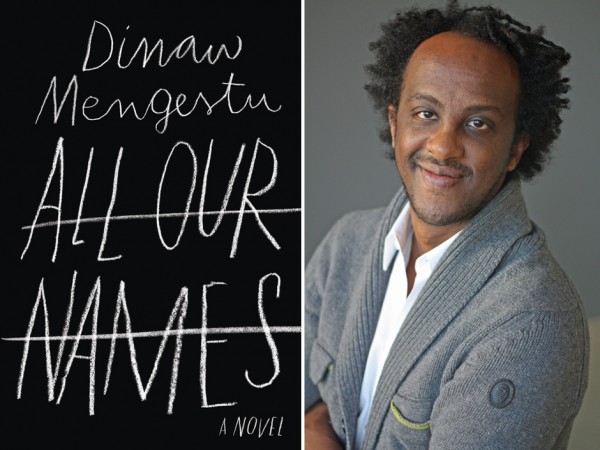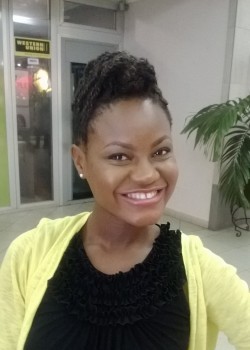What is in a name? Helen and Isaac are common names, easy to pronounce and remember. Both are the narrators in Dinaw Mengestu’s latest book, All Our Names. Last summer, I listened as Dinaw read an excerpt from this book to an audience at the Free Library of Philadelphia. The setting was a diner in Mid-west USA, post- segregation. It was an awkward encounter. Isaac (African) and Helen (Caucasian) walk in and order food amidst stares, or rather a sort of pregnant silence that later results in Isaac being served food on paper plates as opposed to regular dinner ware. A message clearly sent that segregation may be over, but certainly not the raised eyebrows and covert glances dished out to a mixed couple sighted in public. What I heard was interesting, but not that captivating to be catapulted to the number 1 spot on my reading list. Then I saw the cover.
All Our Names written chalk on blackboard style, the black contrasting with the white, then neatly crossed out. How brilliant! I guess I am not the only one who loved the concept as All Our Names was among the New York Times best covers of 2014. I thought about those days in elementary/primary school when teachers wrote down names of noisemakers in the class on the blackboard with a piece of white chalk, and then crossed out each name after punishment had been meted out to that individual.
Isaac and Helen are offenders in their own ways, one running from a horrid past, the other escaping the mentality of a small town that clings to an ought-to-be forgotten past. The storytelling is alternated back and forth between the two and I pick my favorite narrator early on, eager to linger with him and hear more. Interestingly, it is not because of what he is saying, but who he is talking about. This character has swagger and you get that “I love you oh villain, I hate your oh villain” feeling. I am a little confused with this character’s name. He is also called Isaac, so I expect a switch. I read on to discover it and tell myself that I would stop reading when I do. Of course, Dinaw drags this tease to the last bit of the book, which by this time, the plot is moving on a lot faster. Then, the end. Some names are still left hanging. I don’t ask why for that is not important. Be it Adam or Alex, there is a point reached where all names became a blur and the bigger picture is the lesson from the story.
Some might see this book from a racial angle, others cling to the Africa in tumult post-independence era and then, there may be something for those looking for an alternate ending to the “and they lived happily ever after” fairy tale. The most underlined quote in the Kindle version I read was “What I didn’t know until then was that loving someone and feeling loved in return was the best exercise for the heart, the strength training needed to do more than simply make it through life.”
What did I like? The names. Yes, I enjoyed all the names the characters could take up at different phases in their lives and the struggle to maintain an identity. All Our Names certainly caters to the identity crisis and forced identities invented in the face of hardship. So if you decide to read Dinaw’s latest novel, embrace the nicely crafted phrasing and all the above. And on the last side note, Coke deserves high fives for their recent campaign, Share a Coke with…(insert all of our names :)). Receiving a bottle with your name makes you have a rethink on this identity issue.
*************
About the Author:
Nma never forgets books she reads, good and bad. Thus, she is eager to share these experiences with others. Still undecided about which is greater between fiction and non-fiction, she is working on a collection of short stories and curating autobiographical pieces for her personal blog, [email protected].











Literary Criticism of Dinaw Mengestu – Dinaw Mengestu December 12, 2023 17:04
[…] this literary criticism Ainehi Edoro shares her feelings of Dinaw Mengestu’s novel All Our Names. She says that she […]